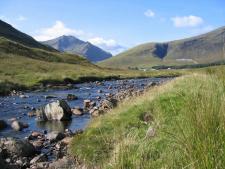
Scotgold’s mining plans at Tyndrum bring hope, life and opportunity
Once-upon-a-time there was a big hoo-ha about a plan to go mining in a National Park.
But this wasn’t the usual tale of extreme poverty fighting off a bid from a rampant capitalism to destroy precious natural assets.
No, in this instance the local community lined up with the mining company against the government. And won.
So how and why did this story develop against the run of play in the context of a wider global narrative which paints mining companies as the despoilers of the earth and archetypal Hollywood bad guys?
First off, it’s worth setting the scene very precisely.
This contest took place in Scotland, the Cradle of the Enlightenment, a country that emerged into the modern era on the coat-tails of famous philosophers like David Hume and Adam Smith.
The country is no backwater of anywhere, as any Scotsman will tell you, and is no stranger to the due processes of government.
To that, Scotgold’s eventual and unequivocal victory in its battle to be able to mine gold at the Cononish gold project near the small town of Tyndrum in the Scottish Highlands stands as small but valuable testament.
Scotgold, it’s true, doesn’t want to build a massive gold mine on the scale of some of the South African mines or the huge Grasberg project in Indonesia.
Grasberg contains over 100 million ounces of gold, whereas Cononish contains a mere 170,000 ounces, and some of those ounces are only measure by inference from other data.
So the Scots knew from the start what they were battling about wasn’t placing a major new industrial hub in the heart of the Grampians, but about whether to allow a small-scale, local business to get off the ground and provide income for the local community.
From the start it was a town versus country issue, or at least that’s how the a large section of the press covered it.
The planners who initially denied the company permission to mine in the Loch Lomond and the Trossachs National Park were the town-dwellers upholding the romantic vision of the Scots countryside held by weekenders and day-trippers.
These people didn’t want their country walks spoiled by sight nor sound of a working gold mine, albeit that the actual mining would take place underground and only the processing facilities would be sited on surface.
Even so, aesthetically, they had a point. Operating plant related to mining is rarely pretty. And it makes noise.
But the question then turned to what the locals thought about it all. In the end, their views would prove to be crucial.
And contrary to the expectations of the day-trippers and urban office-based environmentalists, local reaction was unfailingly positive.
“We had overwhelming support from the local community,” says Richard Gray, Scotgold’s chief executive.
Initially though, the decisions were negative. Permission refused. There followed a lengthy process of appeals and amendments, which eventually lead to a completely new planning application.
“That was approved by the Parks unanimously,” says Richard.
Ultimately, the key factor was one that communities the world over hold as one of the most important issues of all.
“The feasibility study which we did envisages the creation of 63 jobs at Cononish,” says Richard. “These jobs will be 365 days per year, with a regular salary.”
And the importance of that last statement is paramount. Tyndrum’s economy at the moment is based largely around the seasonal rhythms of tourism, which means that incomes are unsteady across a whole calendar year.
And that uncertainty can have knock-on effects on how people live their lives.
Regular work for those employed at Cononish means that banks will be able to give proper consideration to applications for mortgage.
That will provide much needed ballast to a community which, like so many small rural towns and villages, is suffering the denuding effect of young people emigrating to big cities.
It means, in other words, life.





